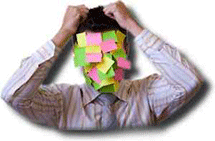 Stop! My brain’s full!
Stop! My brain’s full!Is information-overload getting you down?
Your brain feels sluggish, fatigued and you start forgetting things.
And you can’t fit in one more thing?
That’s brain overload.
Overload occurs when you receive more information than your brain can comfortably process at one time.
The result?
- indecisiveness
- poor decisions
- and stress
There is so much information you lose track of the things you really need to remember.
On a daily basis you are barraged with facts, pseudo facts, chatter and rumour, all pretending to be legitimate information.
It’s exhausting to try to keep track of what you need to know and what you can ignore.
It’s exhausting to try to keep track of what you need to know and what you can ignore.
Plus, we are all doing more.
It used to be that a teller made transactions at the bank, travel agents made our reservations, shop assistants helped us find what we needed, groceries we needed fitted into a basket or string bag and we didn’t spend untold time on ‘hold’ on the telephone to access the simplest of services!
Most of these things we now do ourselves. 24/7.
And we are still trying to keep up with our lives, children, grandchildren, parents, friends, careers, hobbies and favourite TV programmes.
And we are still trying to keep up with our lives, children, grandchildren, parents, friends, careers, hobbies and favourite TV programmes.
So how can we take back control?
Your Brain Overload Survival Plan:
Organizing information optimizes your brain’s capacity.
1. Write it down!
Put your To-Do list on paper.
Carrying around a mental to-do list of say 20 or 30 items uses up too much cognitive energy as you try to recall them and prioritize what’s important.
Use a diary for those must-be-remembered appointments, tasks, or events. This helps you to make objective decisions about what you will tackle and in which order. Writing things down also aids memory.
Carrying around a mental to-do list of say 20 or 30 items uses up too much cognitive energy as you try to recall them and prioritize what’s important.
Use a diary for those must-be-remembered appointments, tasks, or events. This helps you to make objective decisions about what you will tackle and in which order. Writing things down also aids memory.
2. Be organized.
Organizing your physical environment lessens the burden on your brain.
“A place for everything and everything in its place”, especially for those commonly misplaced items such as glasses, keys and smartphones.
Use post-it notes for important reminders, or better still, put useful actions in place. e.g. You hear that it is likely to rain tomorrow. Hang your umbrella or raincoat on the door knob now – that relieves some of the brain clutter that happens when you constantly remind yourself to remember it in the morning.
3. Multi-tasking is a myth!
We re as generation of multi-taskers!
Talking on the phone, answering a text message, watching television while preparing a meal, trying to eat lunch while getting ready to go out.
You tell yourself you are multi-tasking, but you are actually rapidly shifting your attention from one task to another.
This fast-paced see-saw of your attention depletes the brain’s glucose supply – and glucose is the very fuel your brain needs for your neurons to communicate with one another.
Result: You will reach a level of brain fatigue much earlier in the day by trying to do too many things at the same time.
Concentrate on one task at a time with sustained attention.
4. Schedule breaks
When you have many demands on your time, remember to schedule ‘down’ times, too. Take a few minutes for a walk around the block. Your brain will thank you! Research tells us that walking even 15 minutes a day helps the brain function better and stay healthier. Take time to read a book, notice the beauty around you, have a conversation with a friend, meditate, take a few deep breaths.
5. Have enough sleep
Sleep is vital for good brain and memory health.
If this is a problem for you:
- Maintain a regular sleep-wake schedule that suits you and your over-all routine.
- Go to bed and get up around the same time each day, especially when you are focused on developing a good sleep habit.
- Avoid caffeine, alcohol and other chemicals that interfere with sleep.
- Make your bedroom a comfortable sleep environment.
- Establish a calming pre-sleep routine, avoiding stimulating TV programmes and exercise close to bed time.
Key takeaway: When you feel your brain is overloaded give it a break!
YOU are in control.





Too true, I need my beach walk every morning, time for prayers, quiet time maybe conversations with fellow dog walkers,and work out plans for the day
Helpful
Thank you for the advice on brain overload survival. I am working full time in a job that I am still learning, studying in my own time, looking after my family and keeping house. I am extremely tired at the end of the day and seem to keep leaving things such as keys and credit card in various jacket pockets. I do go bed between 8.30 and 9.00pm weeknights, but I get up at 5am weekday mornings. I will try and schedule more breaks from now on to rest my brain.
Excellent advice especially Number 3. useful too, treat your self as you would your best friend.
That is great advice, Gwen and well worth passing on.
Your description is exactly the kind of busy life so many people lead these days – and you can see how your brain struggles to get the processing time it needs! Taking a few seconds to really ‘see’ where you are placing your keys or credit card will help process the information and tell the brain that it is important …. but I know that is just one more thing to factor into your day! Scheduling those breaks will definitely help.
Thank you, Joan. Watch out for more updates …
What a wonderful start to the day! So many people would love to do just as you describe ….. and I am sure your brain is also very grateful!
I spent a whole day doing memory exercises.The next morning I was frightened my brain would not remember the most ordinary tasks.peoples names,what day is it,what should I be doing.etc.,nearly all day. I hope after a day without overload I may be normal.
I guess this is much as you would have felt if you had done a whole day walking or running a marathon! Everything in moderation is a pretty good guide when you are avoiding brain overload. I admire your enthusiasm with your memory exercises – now try weaving just a few each day into your normal routines. The ‘7-day Brain Boost Plan’ gives you a good guide as to the kind of physical exercise, brain food meals and mental challenges you can be giving yourself each day. It is all about balancing these three important lifestyle habits. https://www.brainfit.world/product/7-day-brain-boost-plan/
I have always on been on Rhake brain overload. Large family!!